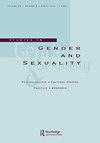Troubling (Un)Happiness: Finding Pathways Toward Liberatory Embodiment
Q3 Social Sciences
引用次数: 0
Abstract
ABSTRACT In this paper, we aim to trouble the territory of affect, specifically happiness, as a site of social reproduction in order to understand the liberatory possibilities that unhappiness offers. We follow the body through various paths of reproduction and explore the implications of a happiness imperative in the context of the body. What does it mean to be a happy body and what does that happiness serve? As two cis women who occupy multiple diverging positionalities, we offer a meditation on what it means to embody and to reject a reproduced happiness through our personal narratives. With a focus on race, body size, age, pregnancy, and queerness, we explore the possible pathways toward claiming the body and moving toward defiance and freedom. We close with reflections on how a reconsideration of (un)happiness and (un)happy bodies can influence a more liberatory psychoanalysis.艰难的(非)幸福:寻找通往解放化身的途径
摘要在本文中,我们的目的是将情感领域,特别是幸福领域,作为社会再生产的场所,来理解不快乐提供的解放可能性。我们跟随身体走过各种繁殖的道路,并在身体的背景下探索幸福势在必行的含义。快乐的身体意味着什么?快乐有什么作用?作为两个拥有多种不同立场的独联体女性,我们通过个人叙事来思考体现和拒绝复制的幸福意味着什么。通过关注种族、体型、年龄、怀孕和酷儿,我们探索了拥有身体、走向反抗和自由的可能途径。最后,我们思考了重新思考(不)幸福和(不)快乐的身体如何影响更具解放性的精神分析。
本文章由计算机程序翻译,如有差异,请以英文原文为准。
求助全文
约1分钟内获得全文
求助全文
来源期刊

Studies in Gender and Sexuality
Social Sciences-Gender Studies
CiteScore
0.80
自引率
0.00%
发文量
15
期刊介绍:
Beginning in the final two decades of the 20th century, the study of gender and sexuality has been revived from a variety of directions: the traditions of feminist scholarship, postclassical and postmodern psychoanalytic theory, developmental research, and cultural studies have all contributed to renewed fascination with those powerfully formative aspects of subjectivity that fall within the rubric of "gender" and "sexuality." Clinicians, for their part, have returned to gender and sexuality with heightened sensitivity to the role of these constructs in the treatment situation, including the richly variegated ways in which assumptions about gender and sexuality enter into our understandings of "normality" and "pathology."
 求助内容:
求助内容: 应助结果提醒方式:
应助结果提醒方式:


